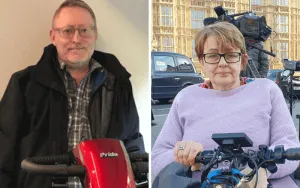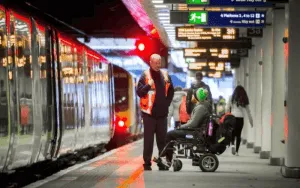The government’s “weak” response to a major report on the inaccessibility of the transport system has left the future of disabled people’s right to travel in “grave danger”, campaigners warned this week.
Although there were some pledges of action from the Department for Transport in its response, accessible transport campaigners criticised the overall lack of commitment to addressing the “long-standing litany of accessibility failures familiar to disabled passengers” across the public transport system.
The government was responding to the damning Access Denied report by the Commons transport committee, which called on ministers and the industry in March to “urgently” recognise that the “regularity and severity” of public transport access failures was a human rights issue.
But disabled campaigners said this week that the government’s response suggests anything but urgent action on these access failures.
The government did promise a review of laws on accessible transport, but it refused to draw up an inclusive transport strategy.
It insists instead in its response that accessibility “should be incorporated as a key area of focus” within its overall approach to improving the transport network.
Transport for All (TfA), the disabled-led campaigning organisation, said the government’s response was “weak” and “lacks commitment” and was “an overdue late nod to a longstanding issue” which “perpetuates inaccessibility”.
On regulation, instead of the call to assess whether there should be a single, central regulator to protect and enforce accessibility across all public transport, TfA said the government had proposed “a piecemeal approach of unenforceable charters and internal letters”.
It said this would “leave a spiderweb of legal loopholes, and allow transport providers to continue failing disabled people”.
Despite the committee’s demand for urgent action, TfA said the government’s response “repeatedly avoids setting clear deadlines for action, and glosses over time frames”.
The Association of British Commuters (ABC) said the government’s response showed disabled people’s right to travel was in “grave danger”.
In February, ABC and representatives of Disabled People Against Cuts, National Pensioners Convention and National Federation of the Blind of the UK accused the government of “betrayal” after it dropped plans to put accessibility at the heart of its plans for the new Great British Railways.
Emily Sullivan, ABC co-founder and a disabled researcher in equality and human rights, said the government response to the Access Denied report showed it “has no intention of doing anything” to address the “regulatory and investment crises in rail accessibility”.
As a result of the government’s response, she has now asked the Equality and Human Rights Commission – which in March chose addressing barriers to key public services, including public transport, as one of its priorities over the next three years – to take action on clear breaches of the UN Convention on the Rights of Persons with Disabilities (UNCRPD).
Sullivan pointed to the government’s continuing failure to ensure a right to spontaneous travel by denying disabled people the right to “turn up and go” across the rail network; its refusal to promise a national action plan on how to achieve “full rail accessibility”; the failure to consult disabled people on some of the key rail issues affecting them; and a deeply flawed regulatory system.
Accessible transport activist Sam Jennings, who runs the campaigning website Disabled By the Railway, was also highly critical of the government’s response.
She said the response to the report was “a nonsense word salad, and from my experience deliberately vague so that the status quo of inaction can be maintained.
“Enough is enough. No rail investment should be signed off unless it’s accessible and inclusive.
“After all, ‘turn up and go’ is an explicit legal right and the failure to uphold our rights is a breach of UNCRPD.
“We need strong leadership now from transport secretary Heidi Alexander, not word salads.
“Successive governments have had three decades to put this right since the first Disability Discrimination Act, and we are still screaming into the void about the basics.”
Disabled activist Doug Paulley, another influential accessible transport campaigner, welcomed the commitment to reforming the “complicated and opaque” legislation on accessible transport, much of which he has highlighted by taking legal action against the industry.
But he said the lack of commitment to improving enforcement of disabled people’s right to accessible public transport was “really disappointing”.
He said: “The existing model doesn’t work, and there’s no reason to believe that further exhorting regulators to do their jobs in this regard will make any material difference.
“Regulators are already subject to the public sector equality duty and have been for many years, as have licensing bodies, yet as noted in the select committee report that hasn’t resulted in reliable effective enforcement.
“It is really disappointing that the government has made no commitments whatsoever to change in that direction, and it completely undermines the whole point of the report.”
He added: “If government really cared about disabled people’s transport rights, they would make it simple and effective to report accessibility failures to a competent body who routinely takes effective action to enforce for disabled people.
“It also doesn’t work unless the government puts their money where their mouth is.
“This response, whilst espousing their commitment to accessible travel, is undermined by the government’s intent on forever delaying and limiting its expenditure on Access for All, failure to ensure purchase of rail vehicles suitable for level boarding, failure to challenge destaffing of public transport, and so many issues.”
Labour MP Ruth Cadbury, who chairs the transport committee, said of the government’s response: “There are warm words and some promising signs in this response to our report.
“But taken together, there is a disappointing lack of urgency to deliver real, lasting progress and improve the daily lives of disabled people – to close the gap between rights and reality.”
She added: “Our inquiry heard so much evidence from disabled people about how their ability to work, access services and socialise is denied by transport services that fail to live up to the promises of equality legislation and policies. This can’t go on.
“We need a zero-tolerance approach to discrimination and inadequacies in our transport services.”
Picture by Office of Rail and Road
A note from the editor:
Please consider making a voluntary financial contribution to support the work of DNS and allow it to continue producing independent, carefully-researched news stories that focus on the lives and rights of disabled people and their user-led organisations.
Please do not contribute if you cannot afford to do so, and please note that DNS is not a charity. It is run and owned by disabled journalist John Pring and has been from its launch in April 2009.
Thank you for anything you can do to support the work of DNS…

 Air travel accessibility report could lead to ‘tangible’ improvements, but progress depends on industry
Air travel accessibility report could lead to ‘tangible’ improvements, but progress depends on industry Regulator’s report on rail assistance ‘shows it is still failing to acknowledge right to turn up and go’
Regulator’s report on rail assistance ‘shows it is still failing to acknowledge right to turn up and go’ Frustration after government only issues partial ban on new floating bus stops
Frustration after government only issues partial ban on new floating bus stops